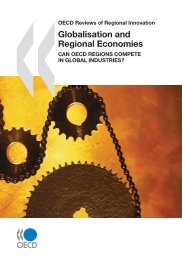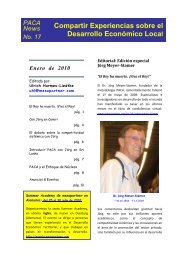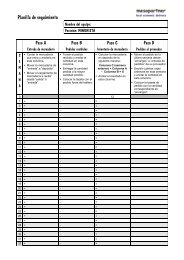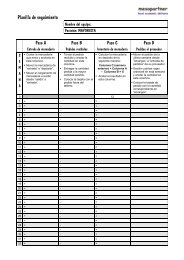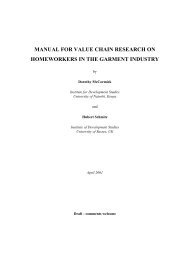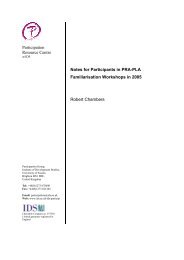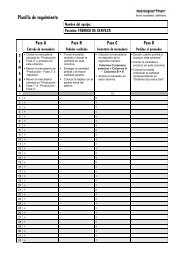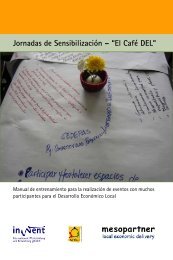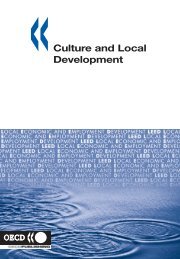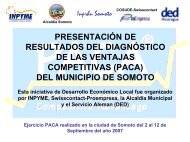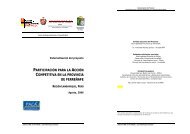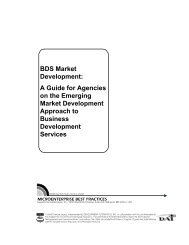PRA-Manual Embracing Participitation tools-only.pdf - PACA
PRA-Manual Embracing Participitation tools-only.pdf - PACA
PRA-Manual Embracing Participitation tools-only.pdf - PACA
Create successful ePaper yourself
Turn your PDF publications into a flip-book with our unique Google optimized e-Paper software.
EMBRACING PARTICIPATION IN DEVELOPMENT: Wisdom from the Field 3.13<br />
to identify similar findings and variations and to determine: 1) whether the<br />
findings have been adequately substantiated with several groups in the community,<br />
and 2) whether additional discussion and analysis is required with a<br />
specific group or different groups in order to triangulate the findings. Team<br />
members must take notes on the discussions to include in the team’s daily field<br />
journal (Part 3, Chapter 3), which is written later that evening.<br />
The process of comparing and contrasting data assists the teams to draw up the<br />
following day’s agenda and plan, (i.e., issues or questions to be pursued with the<br />
community). The other daily activity is for the team leaders to review progress<br />
against the original research objectives to ensure that all topics are being or will<br />
be addressed. Depending upon the complexity and richness of the day’s process in<br />
the field, it is possible that the day’s work may not end until late in the evening.<br />
The final activity for the day for the team members is to write up the daily field<br />
journal.<br />
A SAMPLE DAILY SCHEDULE USED<br />
DURING A PARTICIPATORY REPRODUCTIVE HEALTH NEEDS<br />
ASSESSMENT IN GITARAMA, RWANDA<br />
7:15 AM Meet at rendezvous point and drive to the field<br />
8:30 AM Gather materials at CARE Gitarama office and leave for the field<br />
9:00 AM Begin participatory exercises<br />
1:30 PM Wind down participatory exercises and return to CARE Gitarama<br />
2:00 PM Lunch at the field office; team data review and<br />
prepare presentation<br />
3:30 PM Team presentation (15 minutes per team)<br />
5:00 PM Return to Kigali<br />
6:00 PM Team Leaders plan following day’s agenda<br />
Source: Kambou (1999)<br />
Part 3<br />
1.13 Monitoring quality and encouraging innovation<br />
It is important to remember that there is no ‘fixed’ way of facilitating a participatory<br />
appraisal process. Since the process is flexible and iterative, each<br />
context presents a unique situation. This poses challenges for the facilitator, for<br />
they have to continuously adapt and innovate in the field. Facilitators should<br />
be encouraged to ‘use their own best judgement at all times’, and try out any<br />
new ideas or adaptation of existing methods. PLA methodology is young and<br />
still evolving, and all its major innovations have taken place in the field.<br />
Flexibility and open-endedness of this methodology poses another challenge –<br />
that of ensuring quality. Since there are no standard procedures, or recording or<br />
reporting formats, it is very important that the facilitators, and especially the<br />
supervisors, make a conscious effort to monitor quality. This can be done in<br />
several ways. First, ensure that the facilitators are trained and briefed well about



